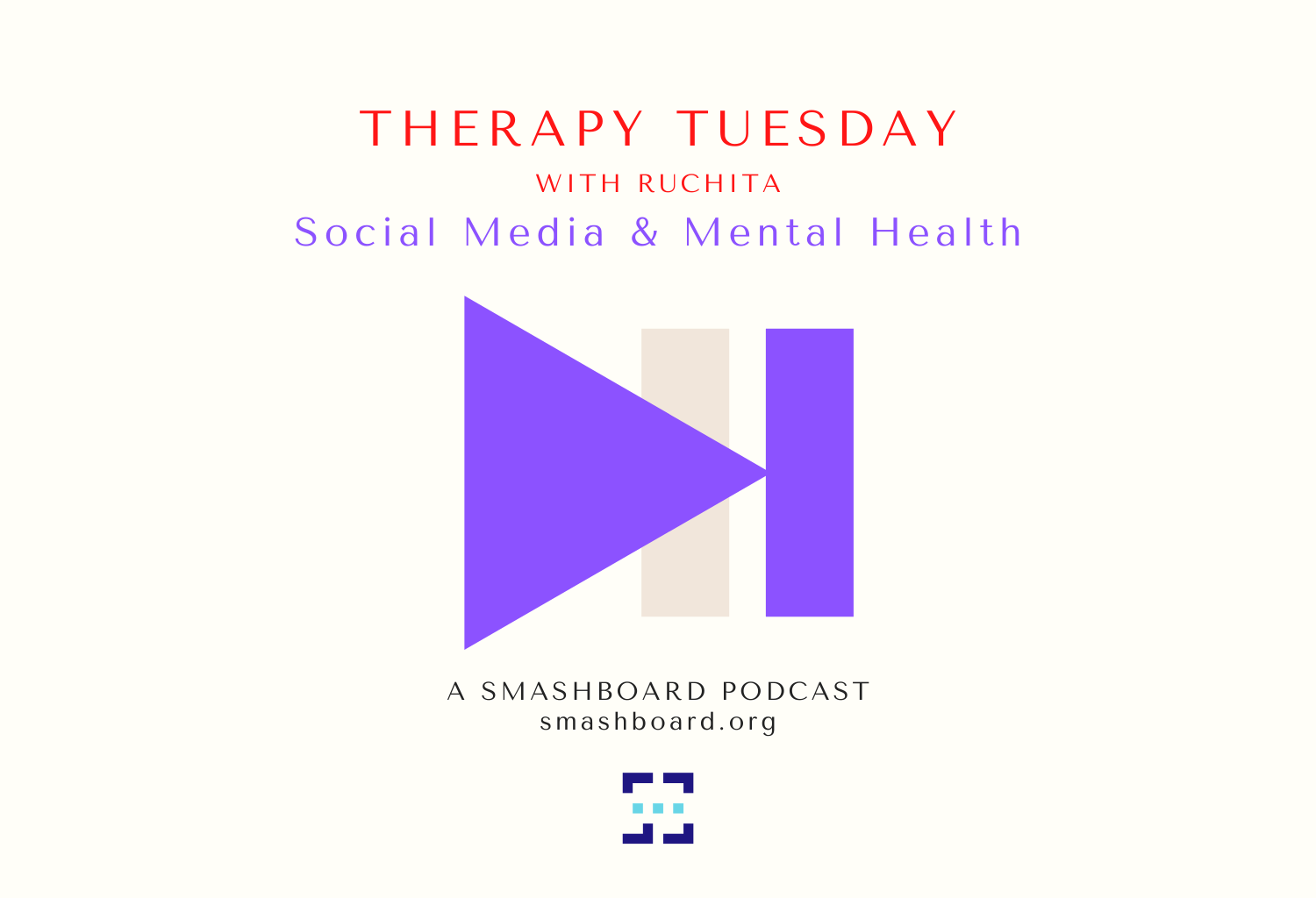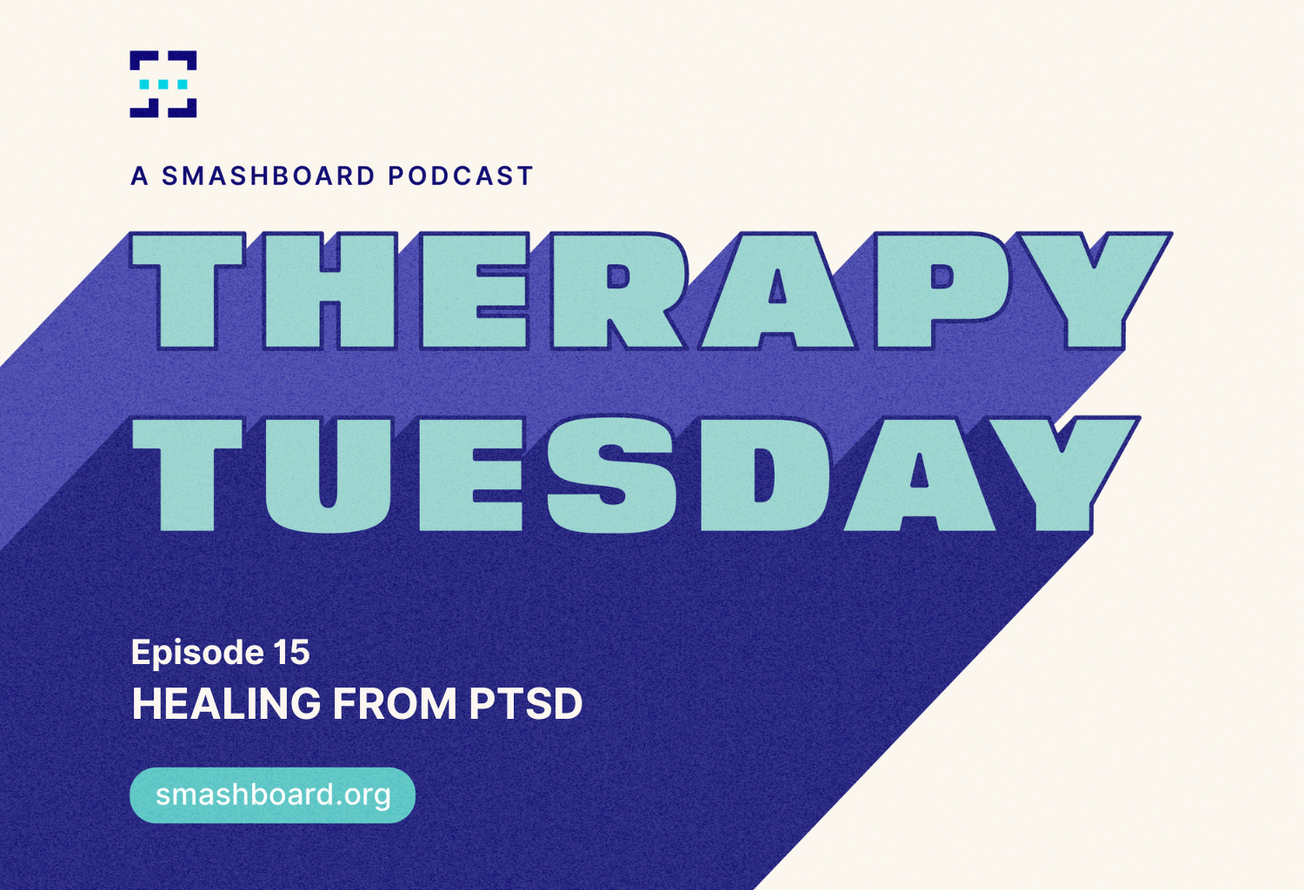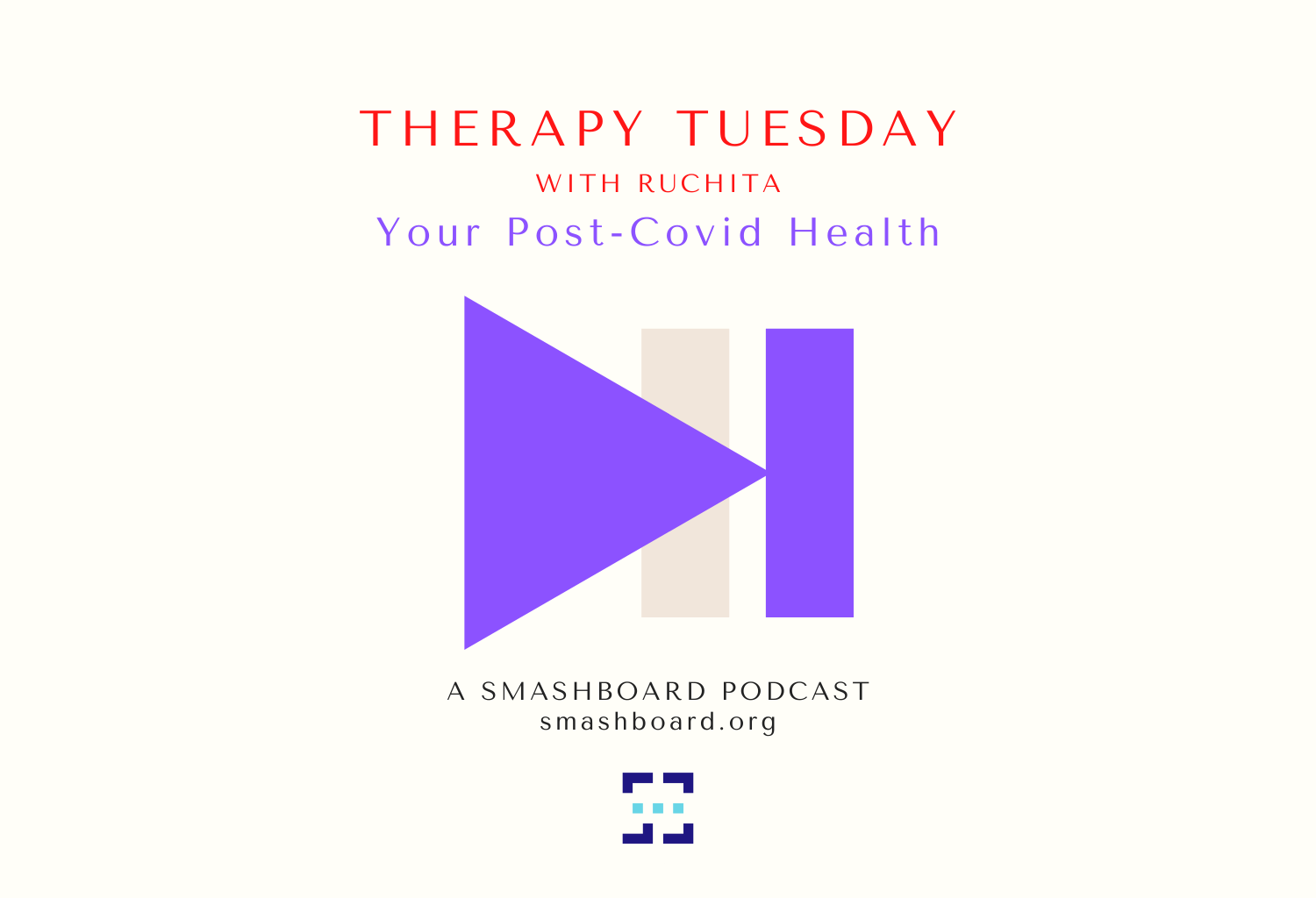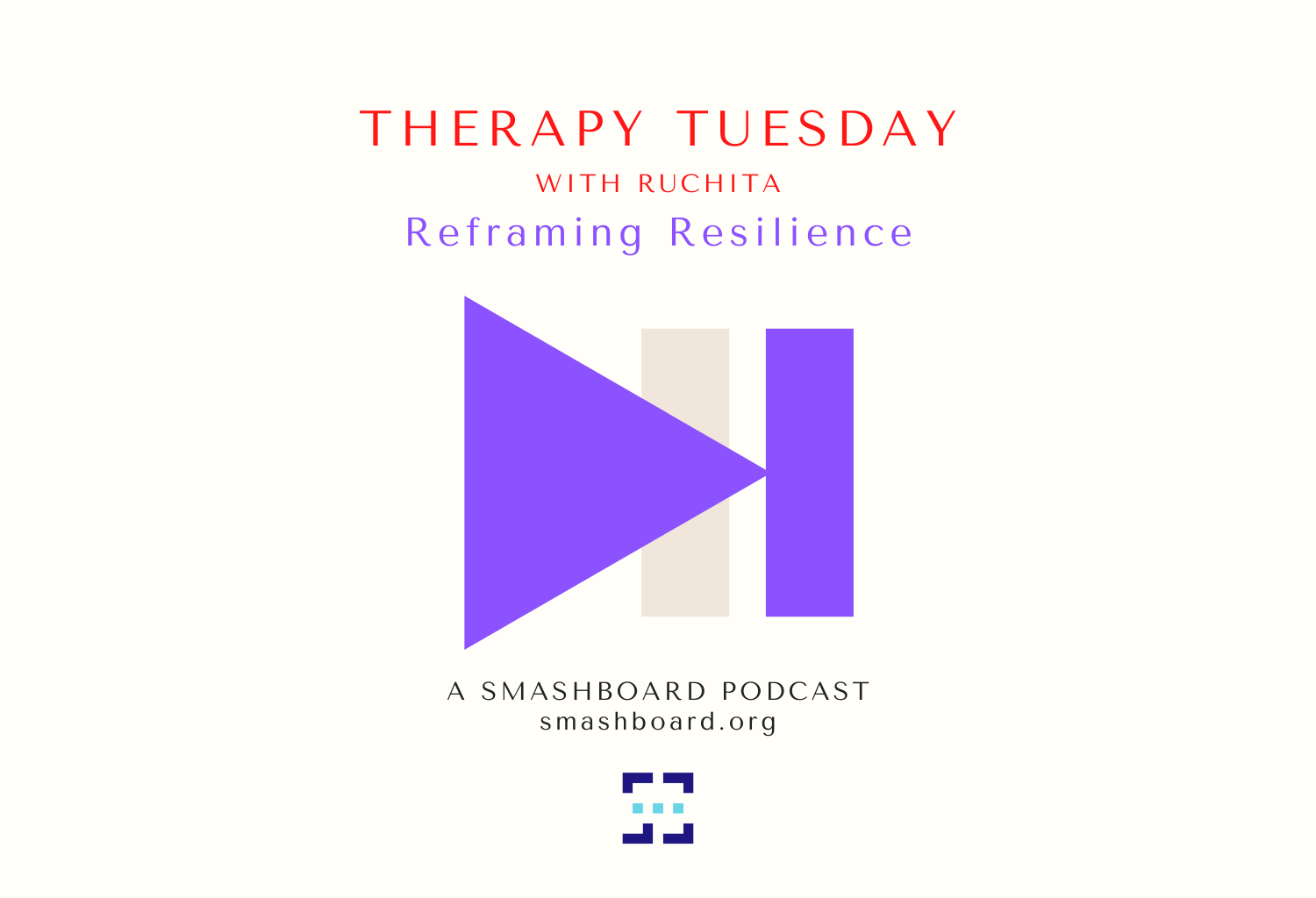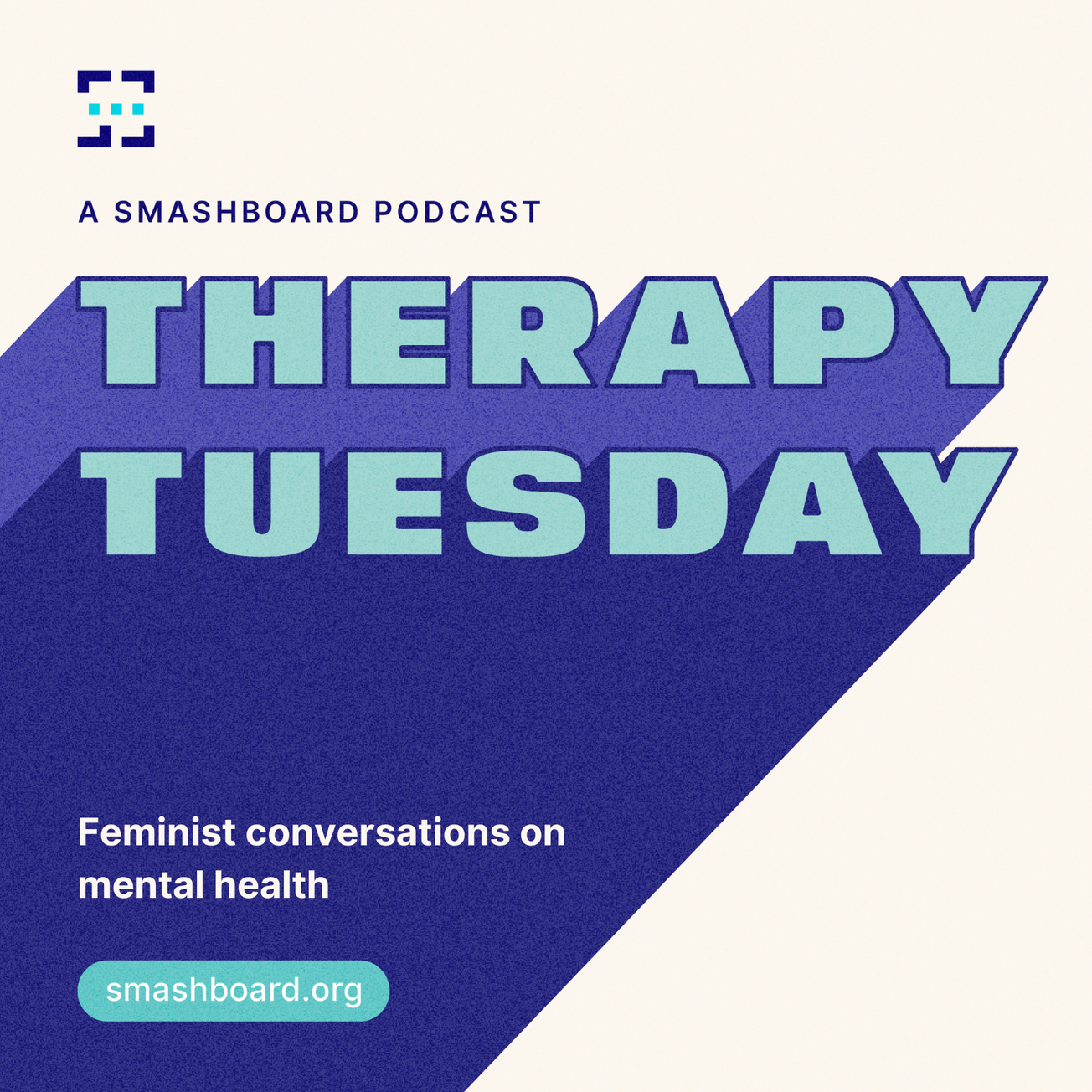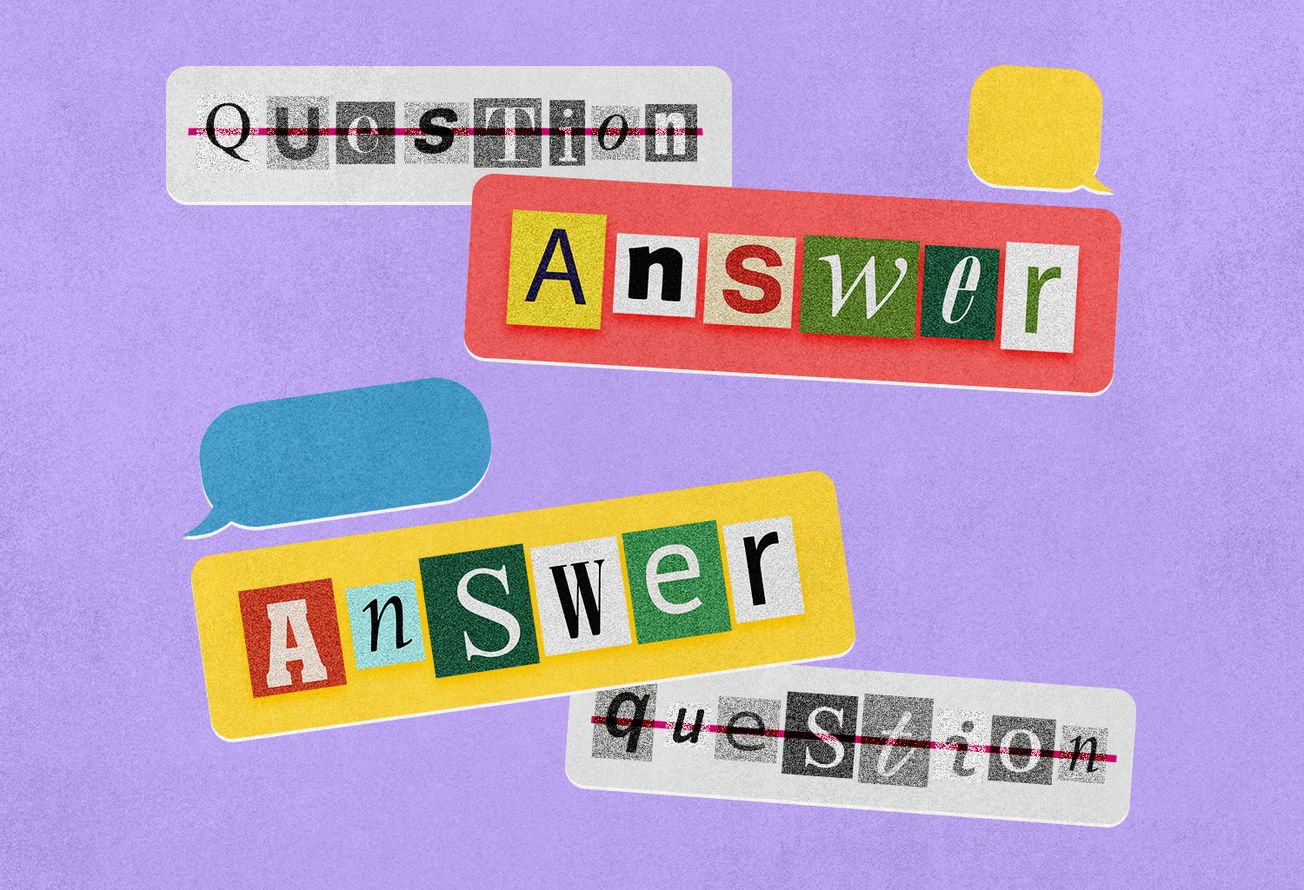Listen to our feminist mental health podcast on your favourite platform. Links here. Please do rate us! And give us a thumbs up/like/star. Have a great Tuesday!
Credits
Host: Ruchita Chandrashekar
Audio Mix and Edit: Depot Records
Scroll down to the end for the full transcript.
APPLE PODCASTS
GOOGLE PODCASTS
SPOTIFY
FULL TRANSCRIPT OF THIS EPISODE:
Hi, this is Therapy Tuesday, Smashboard’s mental health podcast and I am your host Ruchita Chandrashekar. I am a behavioural health researcher and psychologist with a specialisation in trauma and post-violence recovery, and this podcast has been created for people who are looking to have conversations around mental health from a feminist perspective. Remember this podcast aims to be an educational resource and is not a substitute for therapy or treatment. The digital generation and the advancement of technology has had positive and negative ripple effects. While connection has become accessible on one’s fingertips, the addictive nature of hyperconnectivity, exposure to highly curated lives, cancel culture, poor tolerance for dissent, cyber bullying, and abuse have had a significant impact on individual and community mental health. Screen dependency is on a high, self-worth concerns are increasing mental health issues, algorithms and the attention economy have a stronger hold on individuals and the debate continues - do the negatives outweigh the positives or vice versa? Recently, I saw this content creator talk about how Instagram reels and TikTok have made our attention span lesser and how that’s going to impact long-form content and the consumption of that, and I was more concerned just about the attention span that’s been lowering for a consistent period of time and how that’s going to bleed into other areas of our lives. Often I hear people say that when they start a document, they’ll write like 2-3 sentences and then they get hooked onto Instagram and they’re just scrolling, scrolling, scrolling and then they realise that it’s been about 30-45 minutes. So this whole thing of the attention economy and how you’ve been manipulated to spend time on our phones is an extremely important conversation that we need to have. Now with the pandemic, social media has also served multiple purposes. It’s become a tool for professional use, recreational use, and in some countries, even to manage medical resources during the COVID waves. Social media has its benefits. It’s valuable for networking with like minded people, it creates employment opportunities, it provides a platform to showcase creativity and to voice opinions, it enhances connections with loved ones despite geographical limitations and so much more. It’s also become such a vehicle for passing information which I think is a boon and a bane—all of us know about what WhatsApp university is up to. But social media has improved access. We’re waiting less and doing more. It has aided social awareness, it’s aided the creation of communities, and collective empathy and solidarity in this world. It’s a tricky medium, though. It’s helped and worsened loneliness and isolation. Civic engagement is higher but so are cases of social media addiction, depression, and anxiety. We’re aware of how these habits also lead to poor sleep quality, diminishing attention span, and experiencing triggers due to an exposure to ‘trauma porn’ and increased insecurities. Some of the most common questions and statements that keep coming up in therapy when I work with people is, “Should I get rid of my Instagram?”, “Why is reading so many news updates making me restless?”, “I hate my phone”, “I am hooked to TikTok and it’s affecting my life significantly”, or “I feel burnt out by social media”. One person I know noticed a pattern where their legs would get or one leg would get consistently restless if they touched the phone to reply to a WhatsApp message or scroll through Instagram or was scrolling through Twitter or any of these other social media platforms or even responding to an email, and they didn’t catch it for a prolonged period of time. It was this overall bodily jitteriness and then they noticed that they would pick it up and then in a few seconds one of their legs would just start moving. And I think there’s a correlation there that we need to talk about more and more. So given the relevancy of the issue, we thought we’d discuss some doable techniques for managing social media behaviour. Now it takes discipline and discipline is difficult to cultivate. Think about it like building a muscle. It takes time, care, and attention. I am not of the belief that you can scold yourself into discipline. I think coercing yourself into consistency, being flexible and empathetic with yourself can be more helpful. So if you manage Instagram consumption for 3 days and then fall off the wagon and go back to your old ways of consumption, it’s completely normal and possible to go back to managing the behaviour again. I am not saying this process is linear but some of these coping techniques might be possible to incorporate.
So firstly starting with consciously occupying time with other habits. Including habits that do not constitute a screen decreases an attachment to the screen. Consciously setting time aside to read, to cook, to play a sport or even take a nap that is rid of the phone can create a breather from the dependency. One activity that I discovered that I enjoy is colouring and I don’t do it for, like, the one hour entirely. I do it for 10-15 minute intervals twice or thrice a day. I don’t listen to anything, I don’t watch anything while I do it—I’m just engaged with that one spot that I use repetitive action with a colouring pen or anything and enjoy myself. And because I do it in 15 minute intervals and thrice a day, that’s already 45 minutes of a day of no screen time. And mundane as it sounds, I also realised that I enjoy chopping vegetables—just being engaged with that very grounded motion of repetitive action. Social media has a strong hold on people because it provides the satisfaction of immediacy. Dedicating an hour a day to another recreational activity and consciously keeping the phone away while doing something creates newer avenues for satisfaction. Now this is definitely challenging in a time of crisis. Think COVID, protests, political violence even. Because communities use social media as a tool to exchange resources, support one another, and even stay engaged, but I encourage you to think about this as rationing your energy and putting a sustainable system in place because a lot of these fights are long haul fights, and burnout becomes inevitable. So I encourage you to think about these breaks and cultivation of these other habits as a time-out, especially when that guilt of not being as useful starts to hit.
The next thing I want to discuss is disengaging when you have reached your capacity. Now it’s important to disengage from the appliance and the screen but it’s also important to disengage from interactions on social media sometimes, especially given the nature of call-out culture and cancel culture and some of the unregulated systems of accountability that are in place, so sometimes it helps to just step back and examine the purpose of engagement especially when we’re talking to someone online. Social media is a platform for performance and the discussion of an issue that’s at hand, can sometimes become a competition of opinions and an intolerance for dissent. This also creates scope for bullying and harassment, and It is okay and it is important to disengage when you have reached your end of the reserve for engagement. Discourse can sometimes resort to slander, name-calling, and threats, which can be detrimental to individual mental health and also be a risk for significant harm. Disengaging is not a sign of weakness or the refusal to even take accountability in multiple situations. It can often be an assertion of a boundary. Just because someone has refused to engage with an issue or engage with a person online, doesn’t mean that they are not doing a lot of the work offline. And we’re often under this pressure to live up to the standard of performance, and I’m here to encourage you to just step back and examine how that may be impacting you.
Another point that we need to talk about is the importance of educating yourself.
The more you know, the better decisions you can make. One of the positives of social media is the accessibility to information and it is important to know how vulnerable our information and our identities are when we use these platforms. For example, knowing that some apps are designed in ways to keep people on the app for longer made me feel very manipulated and a little more mindful of my consumption. It’s extremely easy to be taken advantage of. Everything as personal as debit card information and birthdays are easily available to multiple websites. Social media propaganda is connected to showing what you want in order to keep you glued to your screens. Think recommendation tabs, Instagram ads or even newsletters that lie in the spam folder of your Gmail.
Now let’s talk about discipline and consumption. Now we’ve addressed how discipline is difficult, and we have to look at it as something we need to cultivate, which means approaching this with baby steps and more importantly, engaging with the problem. I often find that people acknowledge that this is a problem and then shame themselves, but engaging with the problem is literally co-existing with it in the same room and looking at it in the eye. What are apps that you use more, times of day that are more vulnerable. Shaming also puts you in this endless loop and makes you feel like you are a problem. But there’s a difference between you have a problem and you are a problem. Ironic as it sounds, there are also apps on your phone that help you manage social media behaviour and your screen consumption behaviour. I know that Android has something called Zen mode and iOS has something called Flipd because Flipd got me through graduate school and really helped me work on my sleep cycle. So, I don’t know much about Zen mode and I would encourage you to just go and research on that, but I know that Flipd, what it does is when you set a timer on it, it takes all of these apps out of your phone and your iPhone looks as good as new. So you can set a timer for about 30 minutes, 45 minutes, 8 hours—whatever it is that you need, and you can’t go and reactivate all the apps till the timer is done. So I would suggest that if you get one of these apps, start with 10 minutes. See what 10 minutes feels like, because often a withdrawal can kick in as well and that’s very normal, but that’s also one of the most important phases to power though. Remember when we talked about the importance of coercing yourself into consistency, maintaining empathy in self-talk, and just working with yourself to make this a sustainable and flexible process—the process of cultivating discipline with social media, that is, negotiation is another thing that might help with that. Now, I recognise that social media, different videos and whatnot help with mood episodes. Food videos help, puppy videos help, scrolling through something helps, memes help, but it’s important to remember that your coping tools can’t only come from a screen. It’s important that coping tools on a screen are one of many coping skills that you have, so I encourage you to think about what the others can look like. So when it comes to choosing the screen, and if you have other things you can think of, you can make an informed choice of do you have to go to the screen, or can you take a walk, can you take a nap, can you call a friend, can you take a shower—what is it that you have the capacity and energy for. Then if you choose a screen, it’s still an informed decision and maybe you can set a timer to like, okay, fine, I’ll stay on this for like 10-15 minutes and then I can do something else. So it takes a collaborative conversation with yourself as well. Imagine withdrawal like a wave. It can hit you hard but it will also eventually settle. In fact, in a lot of cases, it might be healthy to anticipate withdrawal. Every new behaviour that you put in place comes with some amount of adjustment stress, so if you start like a social media boundary, or you put something in place, or you are trying something new to manage your consumption or like I said, to set a boundary, I would suggest that you give it one week to settle. One week to feel more adjusted with this new change that you have brought into your life and treat yourself and talk to yourself with the same amount of empathy and compassion and motivation that you may have had when you put the behaviour in place at the beginning. There is no perfect way to do this, but it’s important to keep trying and working on ourselves, because social media is here to stay. And we need to examine what a toxic relationship with it looks like versus what a healthy relationship can look like. And I think that definition will keep evolving as the medium evolves. That's all I have for you on this episode of Therapy Tuesday! I hope it left you with something to reflect on and I'll see you soon on another episode.


